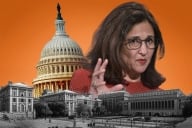You have /5 articles left.
Sign up for a free account or log in.
Today, a special guest blog from one of my College of Charleston Colleagues.
Simon Lewis teaches African Literature at the College of Charleston, and is an associate director of the Carolina Lowcountry and Atlantic World (CLAW) program. His most recent books are British and African Literature in Transnational Context (University Press of Florida, 2011) and Ambiguous Anniversary: The Bicentennial of the International Slave Trade Bans (University of South Carolina Press, 2012). - JW
Charleston, South Carolina, might not be the most obvious site for a discussion commemorating the 150th anniversary of the Gettysburg Address, but that’s exactly what took place November 11th at the College of Charleston.
On a Veterans Day marked by an e-mail honor roll listing all the various former servicemen and women, and a burst of Glenn Miller at a lunch-time concert, the panel discussion offered a complex re-memory effort. Featuring chief Democratic whip Congressman Jim Clyburn, Clemson University professor and Lincoln scholar Vernon Burton, and the College of Charleston’s presidential chief-of-staff Dr. Brian McGee, a professor of Communication, the discussion was the final public event in a year-long project involving collaboration among colleges, historic sites, state and national agencies around the state of South Carolina, commemorating the coincidental 150th anniversary of the Emancipation Proclamation and the 50thanniversary of the desegregation of Charleston County schools and of the state’s two largest public universities, Clemson and the University of South Carolina. The point of linking the two sets of commemorations was to try to move away from simplistic and all too often triumphalist narratives of teleological historical and political progress and to draw attention to the fact that emancipation is not an event but an ongoing struggle—that the expansion of liberty and justice for all requires continuous work, and that that expansion depends in large part on access to education.

During the panel discussion the politician, the historian and the rhetorician duly made all of the points you might expect them to make about the speech, its brevity, effectiveness, and reception, the necessity of reading it in the context of its own time, and the appropriateness of reading it as prophetic utterance -- as a speech for Martin Luther King’s time, or our own time, or the dream-time when the promise of liberty is finally lived up to in full measure.
Perhaps the most striking point was made by historian Burton, who pointed out that Lincoln’s reference to a “new birth of freedom” was not limited to an American context, but needs to be understood in the light of the mid-nineteenth-century world’s retreat from the emancipatory principles of democracy inculcated by the American, French, and Haitian revolutions in the 1830s and 40s, monarchies were reestablished in France, in 1864 Louis Napoleon installed Maximillian on the throne of Mexico, and in 1861 the Italian risorgimento finally led not to the Italian republic Garibaldi and his fighters had desired but to the reestablishment of an Italian kingdom. In the United States, meanwhile, pro-slavery forces (as Walter Johnson’s recent book River of Dark Dreams) has hammered home were gaining in confidence, attempting to re-open the international slave trade and expand the realm of King Cotton into an empire of slave-holding plantation economies in the south of the United States, in the Caribbean, and in Central and South America. Lincoln’s address explicitly reaffirms the core American faith in individual liberty not so much as the right to do as one pleases but as the right collectively of people to govern themselves in such a way as to allow individuals to develop beyond the status of their birth.
In a time when principles of democracy appear to be under attack as efforts are made to complicate the process of voting, Lincoln’s Address should still resonate with us. It reminds us that ideas matter. In the years leading up to and during the Civil War it was by no means a given that principles of democracy were desirable or likely to emerge revindicated. There is no natural teleology of political progress that leads from the Declaration of Independence to the 13th 14th and 15th Amendments, to the Voting Rights Act and the Lily Ledbetter Act. While it may be true that the arc of history tends toward justice, it takes great leaders capable of expressing great ideas in memorable words to keep that arc bending the right way – sometimes those words will lead to almost cataclysmic material struggles such as the Civil War. But when we think of the sacrifice of those hundreds of thousands of men, women and children who died between 1861 and 1865, we need to be mindful that history could equally have taken a different, even more dismal turn. If the principle of government of the people by the people for the people shall not perish from the earth, it is not because that principle is incapable of perishing, but it is because people – individuals, and collectively – will not, shall not let it perish.





